DePauw Discourse Forum Explores 'The Ethics Cauldron'
October 27, 2006
Official DePauw Discourse 2006 Web Site
Also: America "Moving Backwards," New York Times' Bob Herbert Reports
Also: Taylor Branch Discusses 'The Biographer's Craft'
Also: Headlines Belie Strength of US Economy: Presidential Adviser Allan Hubbard
Also: US Education Secretary Praises DePauw's Internationalization Initiative
Also: "No Easy Solution" in Iraq, Says Study Group Co-Chair Lee Hamilton '52
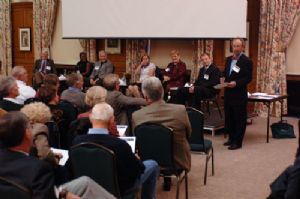 October 27, 2006, Greencastle, Ind. - DePauw University alumni, students and faculty members engaged a six-person forum in a discussion of professional and personal dilemmas during a session of DePauw Discourse 2006 titled "The Ethics Cauldron: Loyalty, Leaders and Tough Choices."
October 27, 2006, Greencastle, Ind. - DePauw University alumni, students and faculty members engaged a six-person forum in a discussion of professional and personal dilemmas during a session of DePauw Discourse 2006 titled "The Ethics Cauldron: Loyalty, Leaders and Tough Choices."
Robert M. Steele '69, the Nelson Poynter Scholar at The Poynter Institute, moderated the group of distinguished guests, including:
- Edward A. Bennett '68, editor of editorials, Louisville, Ky., Courier-Journal
- Raymonda L. Burgman, assistant professor of economics and management
- Robert J. Darnall '60, retired chairman and CEO of Inland Steel Industries
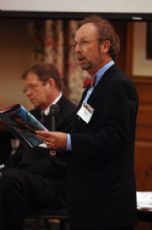
- Elisabeth "Bess" W. Evans '07, communication and sociology double major and Media Fellow
- Rev. Dr. Brenda J. Stiers '60, United Church of Christ pastor
- Larry N. Tibbetts '56, retired major general, United States Air Force
Steele facilitated a wide-ranging discussion of ethical issues by asking each panelist to draw on their experiences and share their thoughts about the recent controversy created by the Hewlett-Packard board of directors -- a situation that made the cover of Newsweek. Some board members allegedly leaked sensitive information to the news media, and others allegedly spied on their colleagues using a method called pretexting.
Following is a sampling 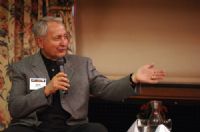 of panelists' comments in response to the question:
of panelists' comments in response to the question:
Robert J. Darnall: Referring to "the dysfunctional behavior of the HP board," he said, "I came closest in my life to writing a letter to the editor after the coverage. Not a single article dealt with the leaker [of HP information to the news media]. I believe the leaker v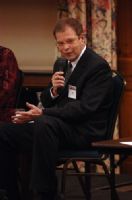 iolated his fiduciary obligation and may have broken SEC rules. None of the articles dealt with what led up to it. I believe that is an outrage."
iolated his fiduciary obligation and may have broken SEC rules. None of the articles dealt with what led up to it. I believe that is an outrage."
Edward A. Bennett: Acknowledging that newspapers often rely on confidential sources, or leakers, he said, "My experience is that leakers tend to be people who are trying to balance various ethical obligations they have." He cited ethical issues that arose from information leaked about the safety of a Louisville tobacco company's products. He discussed how a newspaper has a duty to distinguish between public service journalism and voyeurism.
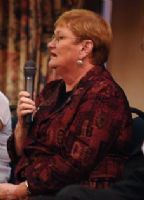 Brenda J. Stiers: She related a church incident in which she was personally involved that had some similarities to the Hewlett-Packard case. "One of the most difficult times in my career was when I was executive minister of a church in New York. Often, members of the board of directors considered themselves representative of various constituencies, and members would leak information on sensitive issues. We ultimately never found out the truth, and I had to decide to terminate an employee. She emphasized that it is an individual's responsibility to 'model a sense of trust.'"
Brenda J. Stiers: She related a church incident in which she was personally involved that had some similarities to the Hewlett-Packard case. "One of the most difficult times in my career was when I was executive minister of a church in New York. Often, members of the board of directors considered themselves representative of various constituencies, and members would leak information on sensitive issues. We ultimately never found out the truth, and I had to decide to terminate an employee. She emphasized that it is an individual's responsibility to 'model a sense of trust.'"
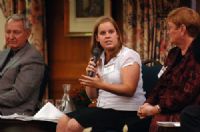 Bess W. Evans: She recently led a student protest of the food service company at DePauw. "It began in a conversation about ethics," she said. "I think there is a moral code for each person, Wiretapping of a phone [referring to Hewlett-Packard] is something I wouldn't do. The perception of each person's ethics translates differently."
Bess W. Evans: She recently led a student protest of the food service company at DePauw. "It began in a conversation about ethics," she said. "I think there is a moral code for each person, Wiretapping of a phone [referring to Hewlett-Packard] is something I wouldn't do. The perception of each person's ethics translates differently."
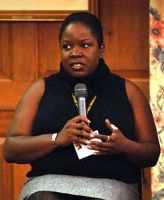 Raymonda L. Burgman: After mentioning that several of her students were in the audience, Professor Burgman said, "I think about the duality of information. We have ourselves in this wonderful academic environment, and I want to pass on so many things to my students. You have to know who you are before you get out into the workplace. Once you get there, it's too late. You have to ask what's your ethical standard, what's your moral code? If nobody asks you here, you won't know what to do when you're in the workplace."
Raymonda L. Burgman: After mentioning that several of her students were in the audience, Professor Burgman said, "I think about the duality of information. We have ourselves in this wonderful academic environment, and I want to pass on so many things to my students. You have to know who you are before you get out into the workplace. Once you get there, it's too late. You have to ask what's your ethical standard, what's your moral code? If nobody asks you here, you won't know what to do when you're in the workplace." 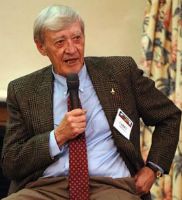
Larry N. Tibbetts: Referring to the Hewlett-Packard case, he said, "Are you expecting a military black-and-white answer here? I have some gray areas." He described a situation he faced as an Air Force officer in Vietnam, when he received orders to send aerial bombing missions that were twice the number required, thus putting at risk twice the number of crewmembers' lives. He refused to obey the order, received support from his superior officer, and the order was subsequently changed.
Members of the audience also had ample opportunity to interact with the panelists by asking questions related to the discussion.
![]() For a complete schedule, speakers biographies and more, visit the DePauw Discourse 2006 Web site.
For a complete schedule, speakers biographies and more, visit the DePauw Discourse 2006 Web site.
In September 2005, DePauw University announced plans to create the Janet Prindle Institute for Ethics. Read more in this previous story, or visit this Web page.
Back